
Editor's Note: This story originally appeared on Living on the Cheap.
Sometimes a good old-fashioned road trip is just the vacation you need.
Driving vacations can be as leisurely or as hectic as you want, and you never have to stick to a schedule. They also can be more affordable than trips involving flights and resorts.
That’s not to say there aren’t expenses. Gas and tolls can add up, and eating out can leave the family budget whimpering “uncle.”
Here are ways to save money on road trips so you can enjoy a fun and affordable vacation.
1. Camp
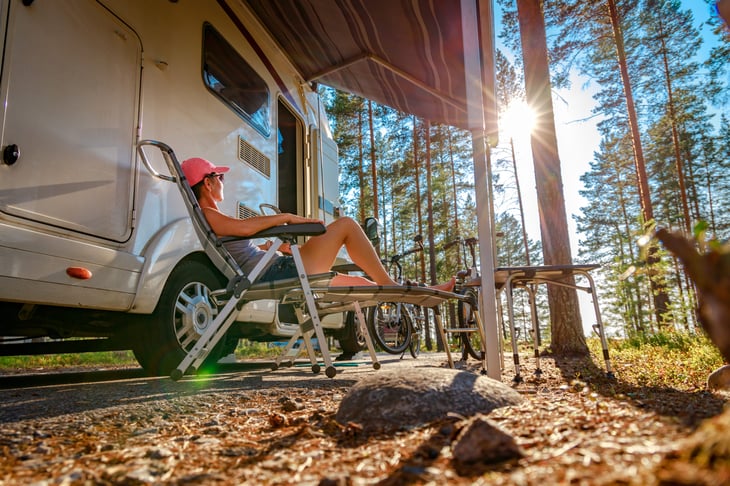
Hotels aren’t cheap, but campsites are. If you already have a tent, sleeping bags and other gear, camping will often be your cheapest road trip accommodation option and a great way to save money on lodging.
Many campgrounds can accommodate walk-ins, but the most popular sites in national parks will need to be reserved months in advance.
You can borrow or rent camping gear if you’re not ready to invest in your own set; you’ll waste money if you buy everything new for one trip and never camp again.
If sleeping on the ground isn’t your bag, look for campgrounds with primitive camping cabins to rent. Or rent an RV; it’s more expensive than camping, but may be cheaper than staying in hotels.
Not only will you save money on road trip accommodations, but many campgrounds are set in parks with free or cheap outdoor activities. With no fancy restaurants or coffee shops nearby, it’s easy not to splurge on travel-related food purchases.
2. Rent

Another affordable accommodation option is to rent a house, cabin or apartment through sites like VRBO or Airbnb.
Rentals can be more affordable than hotel rooms, especially with larger groups, but you also get more for your money, with multiple bedrooms, a full kitchen, and often extra amenities, such as game rooms or hot tubs.
If you really want to save, use AirBnB to rent out just a room or bed in someone’s home; you may or may not have access to common living areas or a kitchen.
Are hotels a must? Here are ways to save if your family requires a hotel.
3. Bring food

Any frugalista knows that it’s cheaper to eat at home than at a restaurant. Your road trip vacation costs will quickly add up if you’re eating out three meals a day — plus stopping for ice cream or gas station snacks along the way.
You’ll save more if you bring food and snacks from home, or pick up sandwich fixings and breakfast cereal at local supermarkets at your destination. Try to limit yourself to only one — or better yet, zero — restaurant stops each day.
For more tips on affordable meals, read about how to take a bite out of road trip food costs and see our favorite recipes for make-ahead road trip meals.
4. Get a pass

Do you plan on visiting multiple National Parks, staying at several KOA campgrounds or touring multiple big-name attractions in your destination city?
You can save by purchasing a pass. Plus, seniors and children may be eligible for free or reduced-rate passes. Check for passes and discounts on those passes to save money on your next road trip.
The National Park Service and many state or regional park associations will sell you an annual pass at a price equivalent to a few entrance fees. Hit more than one park in one road trip or over the course of one year, and your pass has now paid for itself.
In addition, veterans and active-duty military, seniors, U.S. citizens with permanent disabilities and fourth graders are all eligible for free or discounted National Park entry or passes.
CityPASS offers a discounted rate if you plan on visiting many of the major attractions in a city. KOA offers a 10% discount and the occasional free night for campers who purchase its KOA rewards card.
5. Head outdoors
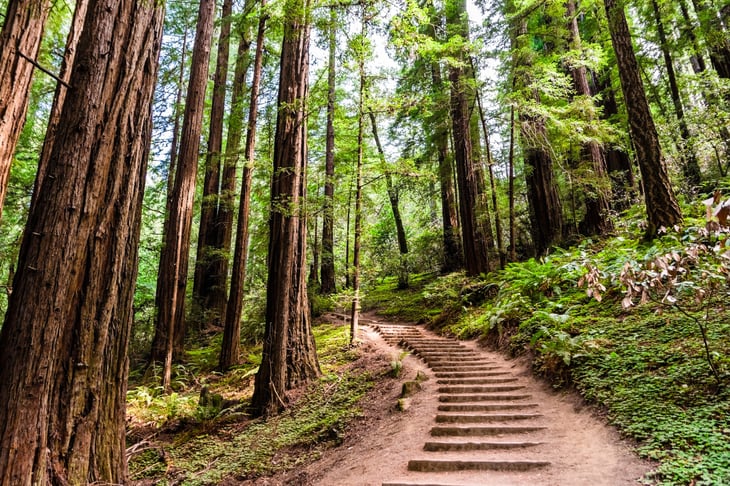
Hiking, fishing, snowshoeing, Frisbee golf, swimming, playing on playgrounds, canoeing and kayaking — all of these activities can be done cheaply or for free.
If you’re on a tight vacation budget, limit, or skip entirely, your visits to expensive amusement parks, science museums and other indoor attractions, and give preference to outdoor pursuits that won’t break the bank.
You’ll still have fun, and you’ll get fresh air and exercise to boot.
6. Pair up and split costs

Traveling with friends is twice the fun at half the cost. You can share a rental home, RV or campsite, and split food prep and costs.
If you all fit in one large car, you can take turns paying for gas. Plus, your friends might have gear you don’t have, so you can save the money you’d otherwise pay to rent that tent or fishing pole.
Plus, chatting with friends or playing board games together is somehow more fun in a group than when it’s just you and your spouse. That means you won’t be looking to spend money on evening entertainment just to have something to do at night.
7. Get a tune-up

If you’re going to put serious mileage on your car make sure it’s road trip-ready before you set out.
Take your car to the shop for a tune-up, and have the mechanics check the fluid levels and filters, the state of your tires and spare, and the condition of the engine and headlights. (Or do it yourself if you’re knowledgeable about cars.)
While a tune-up will cost you, it will be far cheaper than breaking down on the road, hiring a tow truck and paying for expedited repairs from an unfamiliar garage.
8. Prepare for emergencies
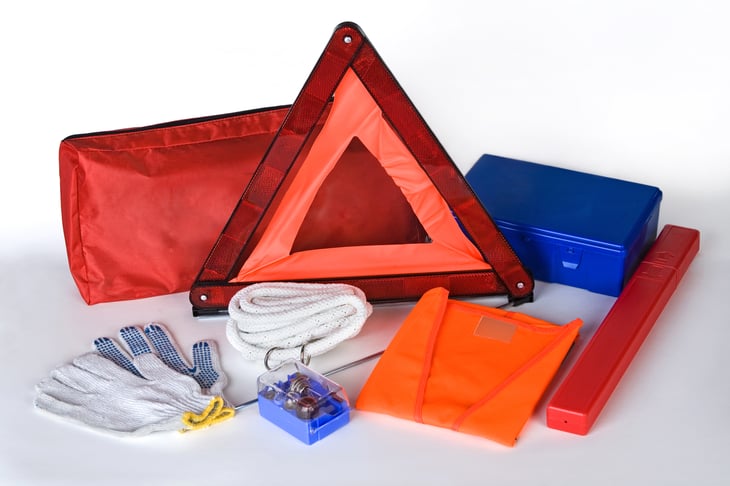
While you’re checking out your car, make sure the tire iron, jack and jumper cables are in the trunk. You want to be prepared for any unexpected events.
Stow an emergency kit with first aid supplies, warm clothing or blankets, flares, flashlight, paper towels or rags, and a garbage bag. The more prepared you are, the less you’ll need to rely on expensive emergency services.
Also, consider signing up for AAA or another roadside assistance program. You’re covered if something goes wrong, plus some offer other perks, such as free maps, route planning and attraction discounts.
9. Don’t speed

There’s something about driving for hours that makes you antsy to get there already. Suddenly, 80 mph feels like 55. If you’re tempted to speed, don’t.
Cars are more fuel-efficient between 50 and 60 mph, so you’ll go farther on your tank of gas if you stick to the speed limit.
Plus, the faster you drive, the less time you have to react to a car cutting you off, an object in the road or that exit you’re about to miss. That means you’re more likely to get into an accident — and we all know that crashes are both dangerous and expensive.
Stay safe, so you can enjoy your road trip destination … when you eventually get there.
10. Plan for cheap gas

Rest areas along the highway know they have a captive audience and have no incentive to discount prices on gas. If you want to save money on road trip gas, you’ll need to plan ahead.
Use a gas app like GasBuddy to find the cheapest gas along your route. Bring extra cash so you can take advantage of any discounts for paying in dollars rather than with a credit card.
If you’re a Costco member, look for Costco warehouses with gas stations along your route; they often have the cheapest prices for gas.
Or, sign up for a program, such as Shell’s Fuel Rewards, Pay With GasBuddy or your supermarket’s fuel points program. They all let you earn points toward free gas or receive discounts on fuel costs.
Register well before your trip and hoard your points to use to cut your road trip gas costs.
11. Map out your route
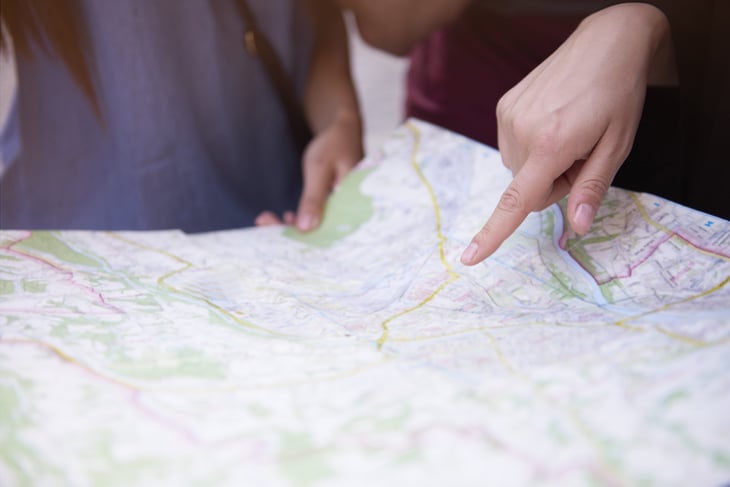
Nothing wastes gas and money more than getting lost and driving miles out of your way. A road trip is no time to wing it.
Plan the best route for your road trip before you leave home, and have a few alternative routes in mind in case you need to detour around an accident or want to hit an extra attraction because you’re making good time.
Use a map app, or get route-planning help from your roadside assistance program.
You’ll also save money when you don’t have to stop for an emergency dinner at the only restaurant available because you didn’t make it to your destination in time for your planned meal and everyone is hungry and cranky. Phew!
12. Plan for parking
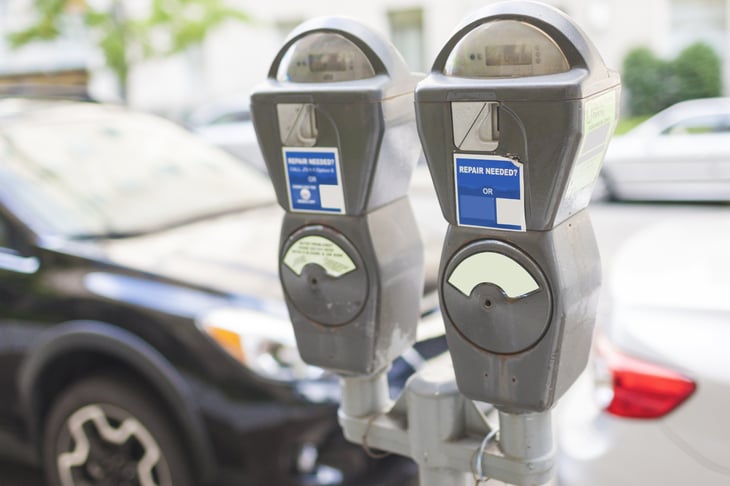
If your road trip destination is a city, you might find that your hotel or rental doesn’t come with free parking. Parking fees can eat through your road trip budget faster than you can say “parking lot.”
Read our story about apps to save you money on the go; it includes ways to save on parking.
To save money, investigate the parking situation for your accommodations before you hit the road. If free parking is not available, search for the most affordable parking options nearby.
Is there a lot with a flat 24-hour rate and reentry privileges? Should you park outside the city and take public transportation to your final destination?
Even better, don’t book that rental apartment or motel without understanding the parking options and fees.
It might be better to stay a bit farther out of the city at a place with free parking and use public transit to get around — or only pay for parking when you absolutely need to.
13. Avoid tolls
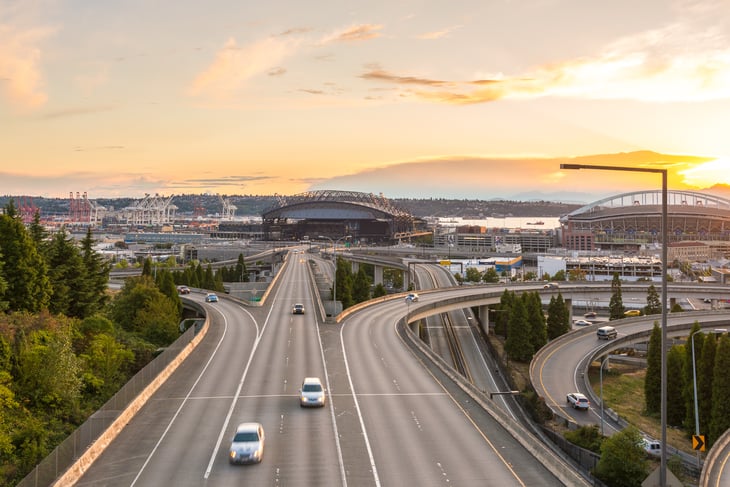
When you have a choice of routes, pick the one with the fewest tolls. Those toll roads don’t always save you time, and if they’re slightly shorter than other options, the money you spend in tolls could be more than what you spend in gas on the alternative highway.
Plus, if the toll road gets backed up, you might have fewer options for exiting and detouring around the problem.
If the toll road is your best bet, you might be able to save money by purchasing a transponder that works with E-ZPass or other electric toll systems.
Some toll roads charge a lower fee to cars who pay electronically versus those that pay in cash; others have discounts for autopay plans and high usage.
Plus, a transponder saves you from digging frantically in your purse and pockets for exact change and from the tickets you’d get for blowing through a toll gate if you don’t have cash on hand.





Add a Comment
Our Policy: We welcome relevant and respectful comments in order to foster healthy and informative discussions. All other comments may be removed. Comments with links are automatically held for moderation.